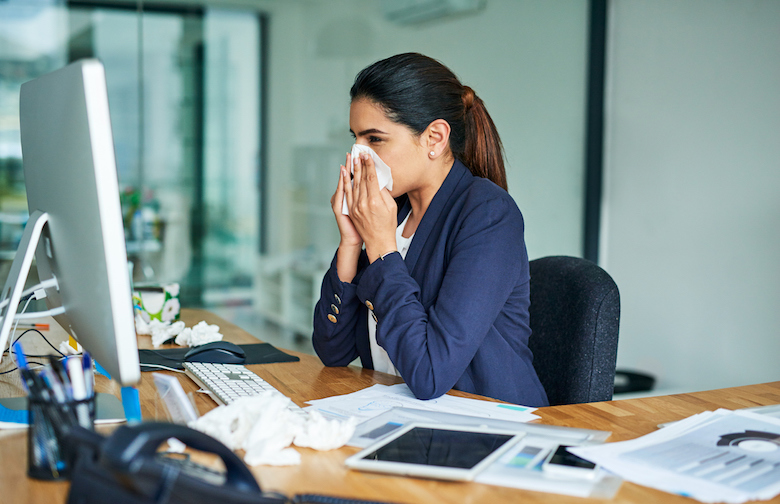Feed a cold, starve a fever, don’t go out with wet hair – there are so many cold myths out there, it’s hard to know what to believe. Leading London GP Dr Sarah Jarvis, sets fact from fiction
Britain is facing another flu epidemic, thanks to current plummeting temperatures and warnings that the cold weather will only get worse.
In fact, Public Health England has confirmed that GP consultations for flu and are up and the spread of flu has already had a high impact on hospital departments, since this last batch of cold weather hit.
But when a cold strikes, you’re often so desperate to get rid of it you will try anything, including strategies you probably only half believe that your great grandmother, or some other un-renowned cold expert, once told you.
In fact, a recent study interviewed ten parents and seven of them reported using strategies with little or no scientific evidence to prevent colds, such as telling their kids not to go out with wet hair.
‘Not only will you not do yourself any good by taking antibiotics for a cough or cold, you’re more likely to develop future infections which are resistant to antibiotics if you’ve used a lot of them in the past.’
What’s more, a survey published in October last year found that, despite doctors being given fresh advice not to prescribe antibiotics to treat a cold, 70 per cent of men and almost half of women are still asking their doctors to prescribe them for their sniffles.
‘Given how often I see patients with colds in my surgery, I shouldn’t be surprised at these figures,’ says London GP Dr Sarah Jarvis.
‘But even I am shocked at quite how many people expect antibiotics for a virus infection. There is nothing the GP can offer if you have a cold – your pharmacist on the other hand, is an invaluable source of expert advice and treatments for your symptoms.’
This got us thinking about how much folklore exists about colds, and how much of it we cling to whenever symptoms strike. We asked Dr Jarvis for clarification on some of the big myths.
1. Antibiotics will make your cold go away faster
‘The common cold, like most coughs, is caused by viruses,’ Dr Jarvis asserts. ‘Antibiotics have absolutely no effect on viruses – they only work for bacterial infections.’
But the risks are more far-reaching than that. Constantly taking antibiotics could mean they won’t work for you when you really need them.
‘Not only will you not do yourself any good by taking antibiotics for a cough or cold, you’re more likely to develop future infections which are resistant to antibiotics if you’ve used a lot of them in the past.’
2. You should go to your doctor if you have a cold
Believe it or not, over a third of us still visit our GP for the common cold with 85 per cent of those waiting an hour to be seen. That’s determination – but for what?
Your GP can’t give you anything for a cold, says Dr Jarvis. ‘Even paracetamol and ibuprofen, which you can use to treat the muscle aches and sore throat that come with a cold, aren’t available on prescription anymore. There is just no point seeing your doctor for a cold, go to your pharmacist instead [see below]’.
3. There’s nothing you can do to stop or shorten a cold
‘There is simply nothing your GP can offer if you have a cold,’ Dr Jarvis asserts. Indeed, Dr Jarvis emphasised your pharmacy as the first port of call when a cold strikes. They’re a font of information about remedies that can help treat the symptoms quickly and effectively – and with proven evidence.
You’re most infectious in the first few days of having symptoms
One such remedy is ColdZyme (£9.99 from Boots, other pharmacies and Amazon), a mouth spray designed to be used at the first sign of a sore throat to help prevent a full blown cold from developing. It works by forming a protective barrier over the throat, making it more difficult for the cold virus to cause illness.
According to a double-blind, placebo-controlled pilot study on ColdZyme published in November 2017, using ColdZyme could reduce the number of days patients showed symptoms by half, from six and a half to just three. There’s a stack of other scientific evidence showing how well it can prevent colds from developing here.
4. If you’ve had a cold for more than a few days, you’re no longer contagious
‘You’ll actually be infectious for a couple of weeks,’ says Dr Jarvis. ‘From a few days before you develop symptoms until you’re completely recovered.
‘But you’re most infectious in the first few days of having symptoms, when you tend to be coughing and sneezing the most.’
5. You can catch cold by getting cold/sitting in a draft/or getting wet hair
‘There is some evidence that very cold weather reduces the ability of your ‘first line of defence’ – that is the lining of your mouth and nose – to stop the virus in its tracks and prevent it from getting through into your system,’ says Dr Jarvis.
Rhinovirus – the cold virus – also replicates more effectively in cold weather, she says. So the old ‘you’ll catch your death out there’ thing is not that far-fetched.
‘So while having wet hair or sitting in a draught are unlikely to make you more prone to catching a cold, it is worth covering up your mouth and nose with a scarf if you’re out in cold weather, to keep the inside of your mouth and nose warmer,’ Dr Jarvis advises.
6. Feed a cold, starve a fever
There is some evidence that eating increases levels of gamma interferon, part of the body’s immune system which is particularly good at fending off virus infections, Dr Jarvis points out.
‘Interleukin-4, on the other hand, a part of the immune system efficient at fighting off bacterial infections (which more often cause a fever), is raised by fasting,’ she explains.
‘Having said that, influenza is a virus rather than a bacterial infection, and it definitely causes high fever, so the theory doesn’t always work.
‘We certainly didn’t know about the immune system when the old wives’ tale began, and the evidence is definitely not strong enough for me to recommend it to patients, but there may be a small grain of truth in it.’
7. Catching cold will weaken a child’s immune system
‘Every time you’re exposed to a virus, your immune system develops resistance against that virus, which means it can fight it off if exposed to it again in the future,’ says Dr Jarvis.
‘So children who catch lots of colds may actually have better immunity in adulthood,’ she says. But that’s not the cause with influenza (the flu virus), which changes every year. ‘Catching the flu once doesn’t give future immunity.’
8. You can sweat out a cold in a sauna/with extra blankets
This one is a big no-no. ‘We definitely don’t recommend sweating out a cold,’ Dr Jarvis warns. ‘You tend to lose more fluid anyway by sweating when you have a fever, so placing yourself in a sweaty environment carries a real risk of dehydration, which can make headaches and poor concentration worse.’
9. You should soldier on attending work/social events to prove you’re ill
Whether you think you’re guilty or not, this one is common. A whopping 92 per cent of the over-35s go to work with a cold, with women more likely than men to soldier on.
Meanwhile, 40 per cent of us would rather force ourselves to attend a social engagement to prove we have a cold, rather than be judged or not believed for cancelling plans.
‘This is a tough one,’ says Dr Jarvis. ‘You can pass on virus infections when you have them, so you’ll probably reduce the risk of infecting others if you stay at home,’ Dr Jarvis concedes.
‘But the average adult gets about 3-4 colds a year and it’s not practical to take two weeks off for every cold you get.
‘What’s more, you’ll probably have infected most people you’re in regular contact with before you have symptoms,’ she explains.
‘But it’s definitely worth limiting your exposure to new people while you have a cold, so do avoid social engagements.’
Dr. Sarah Jarvis, MBE is a general practitioner working in Shepherd’s Bush, London, England, and she also works in the mass media to promote health. She was educated at Millfield and qualified as a medical doctor in July 1986 from University of Oxford.
Follow Dr. Sarah Jarvis on Twitter, DrSarahJarvis
More Healthista Content:
5 natural ways to boost your immune system
5 reasons not to skip your next smear
Always tired? These 22 energy hacks will surprise you
Like this article? Sign up to our newsletter to get more articles like this delivered straight to your inbox.

























































